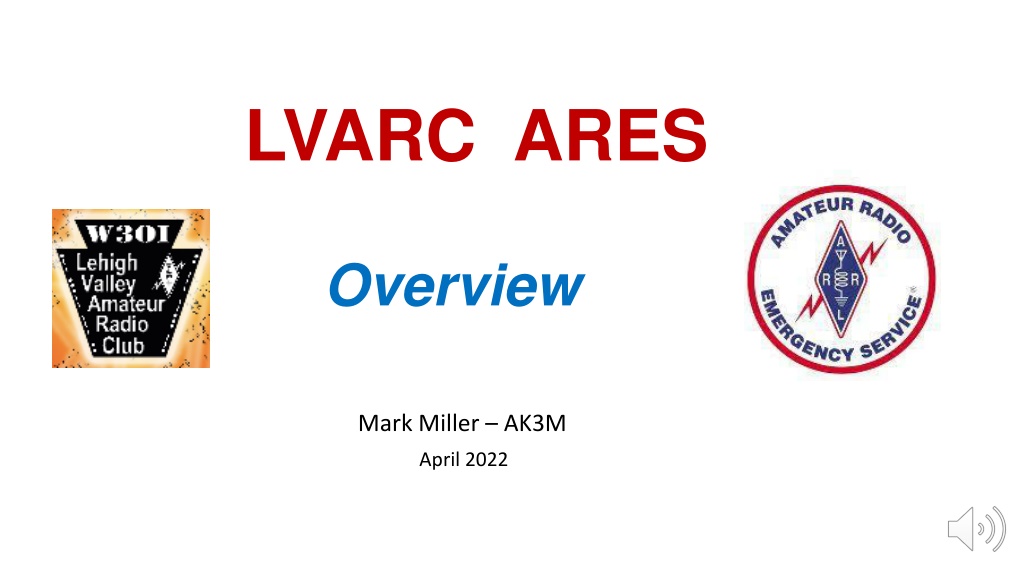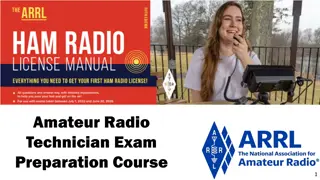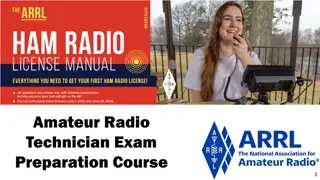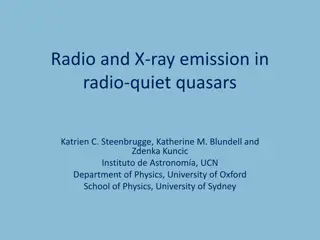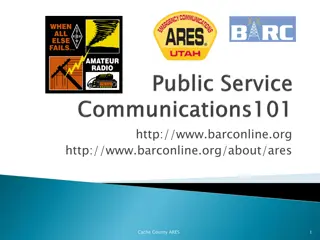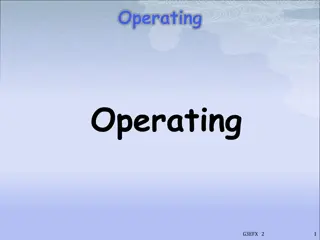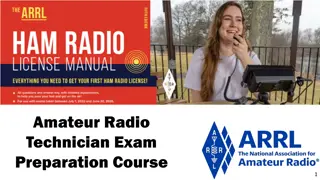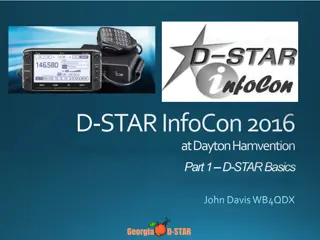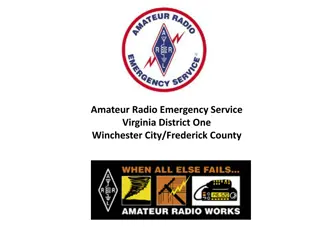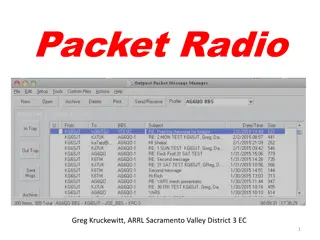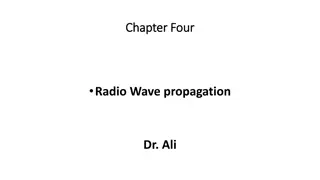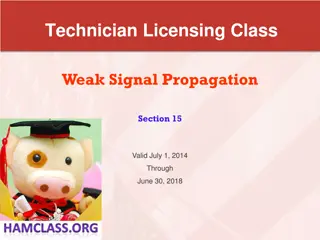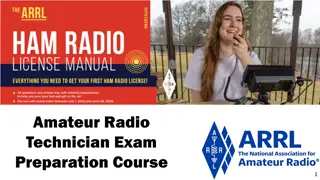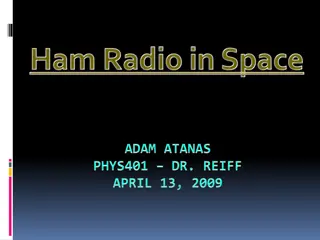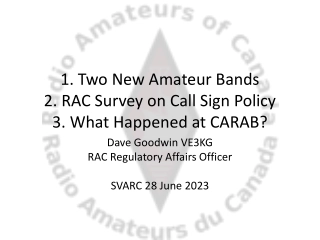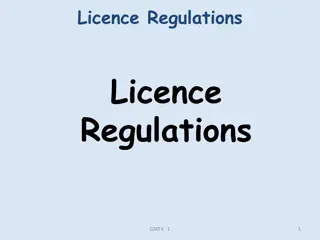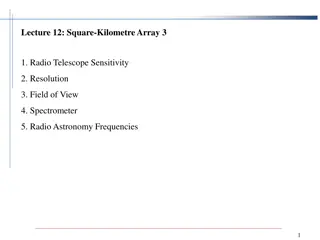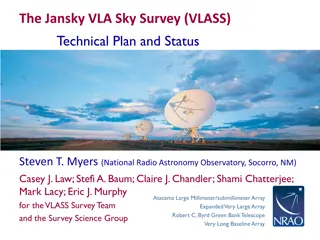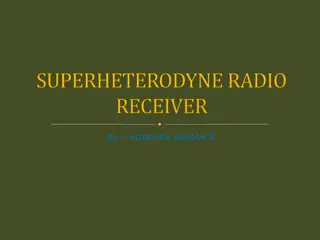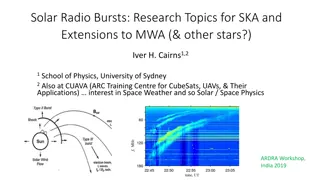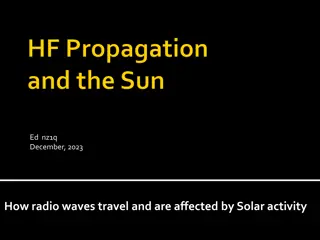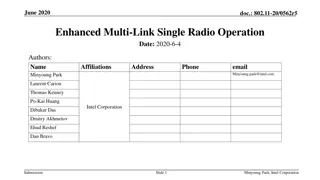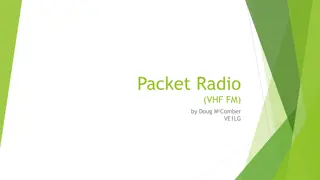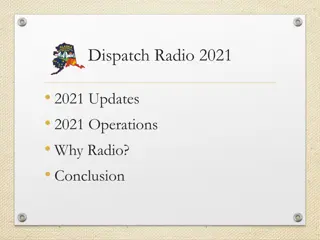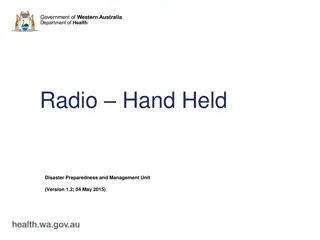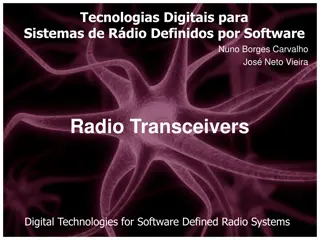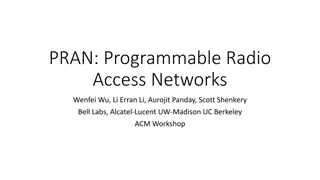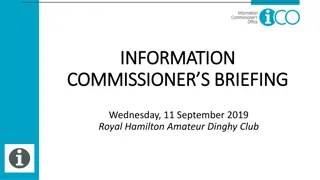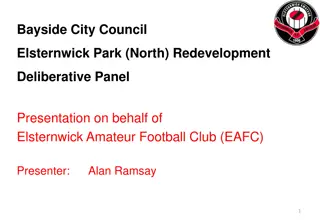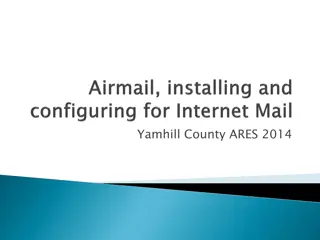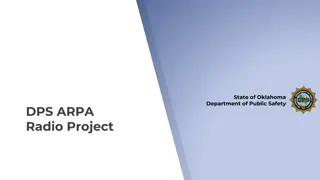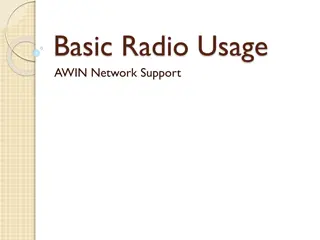ARES Overview: Supporting Local Events with Amateur Radio
ARES, the Amateur Radio Emergency Service, supports local events by providing crucial communications support. Volunteers help with traffic handling, emergency reporting, and ensuring smooth event operations. This presentation covers what ARES is, how it functions, volunteer expectations, the importance of using amateur radio, what to bring to an ARES event, and tips for successful participation. Learn about ARES events, volunteering opportunities, and the significant role of amateur radio in community events.
Download Presentation

Please find below an Image/Link to download the presentation.
The content on the website is provided AS IS for your information and personal use only. It may not be sold, licensed, or shared on other websites without obtaining consent from the author. Download presentation by click this link. If you encounter any issues during the download, it is possible that the publisher has removed the file from their server.
E N D
Presentation Transcript
LVARC ARES Overview Mark Miller AK3M April 2022
What is covered in this presentation 1. What is ARES? 2. How does ARES support local events? 3. What you are expected to do at an ARES event. 4. Why use amateur radio? 5. What to take to an ARES event. 6. Tips for a successful event. 7. Why should I volunteer for an ARES event? 8. What are and when are these events? 9. How do I know about these events and how do I volunteer?
What is ARES? ARES stands for AmateurRadio Emergency Service Although ARES contains the word emergency, community events are included in ARES. Unlike RACES, ARES events are managed by the ARRL and local clubs and not local government agencies.
How does ARES support local events? The LVARC participates in four local ARES events during the year. ARES volunteer s purpose is to provide communications support TO and FROM sites around the event course to the Net Control station for the agency hosting the event. What ARES Operators Do NOT Do ARES volunteers are NOT EMS or Fire Police personnel. You are NOT expected to administer first aid or direct vehicular traffic. We provide communications ONLY. The best way an ARES operator can help is to report any problems to the Net Control Station. Event personnel are aware of what we do.
What you are expected to do The LVARC places operators around the course where the evet is held as well as at the Net Control Station who is in contact with event coordinators and EMS. The operators job is to pass any traffic from their station to the Net Control Station. Water stops are convenient for operator positions. All event participants will pass these points. The 146.94 repeater is used as the primary event repeater with the 135 machine as a back up. Communication traffic is based on a modified National Traffic System (NTS) format. Traffic handled can range from ROUTINE, PRIORITY and EMERGENCY. Examples of these formats: 1. ROUTINE This water stop needs more cups. 2. * PRIORITY Event participant down but does NOT require immediate medical attention. 3. * EMERGENCY Runner demonstrating behavior that needs IMMEDIATE medical attention. * If priority or emergency traffic, state that when calling NCS.
Why use Amateur Radio? Why is amateur radio important in local events? Why not simply use cell phones? Amateur radio offers real time communications. Using amateur radio allows all stations to hear what is happening at the same time.
What to take to an ARES event (Suggestions only) Operator positions vary. If you volunteer for an ARES event, you may not be in a building or your car. That means, you will be subject to the weather. You also may not be able to operate from your vehicle (mobile radio). Items you may want to take include: 1. Folding chair 3. Appropriate weather gear 5. HT 7. Creature comforts 9. ID 2. Snacks/water 4. Your Go Bag 6. Extra HT Battery, antenna etc. 8. Pen, note pad 10. *Reflective vest * You do NOT need a vest to participate in an ARES event. A vest however, allows event participants to identify you as being with the event and can approach you for help.
Tips for a successful event 1. Prepare all your equipment the night before the event. 2. Charge your radio(s) BEFORE the event so that they are ready for the event. 3. Have your radio(s) programmed BEFORE the event. 4. Arrive at your assigned post well in advance of the event. Often there are road closures. 5. go through the Net Control station during the event. Remember that communications will operate under a directed net. ALL communications will 6. No stations are to be dismissed without NCS permission. 7. If there are others at you station, introduce yourself to them and tell them who you are and what you can do (communications with EMS and event staff).
Why should I volunteer for an ARES event? 1. ARES events allows LVARC operators to practice traffic handling. 2. An ARES event allows operators the chance to use his skill and equipment to help local community events.
What and when are these events? ARES events that the LVARC has served in the past include: St. Luke s Half Marathon April Hanover Township Spring 5K June Women s 5K Classic - October Delaware & Lehigh Heritage Half Marathon Run/Walk - November
How do I know about these events and how do I volunteer? ARES evets are scheduled and announced well in advance of the event date. That gives operators enough time to check their personal calendar and gather their equipment. ARES events are announced on the Monday Night Net, in the VOX and during an LVARC meeting. If you want more information or want to volunteer, contact Mark (AK3M) at AK3M@rcn.com.
This Power Point is available This PowerPoint presentation is available on the Lehigh Valley Amateur Radio (W3OI) Club s web site. or you can email Mark (AK3M) at AK3M@rcn.com.
